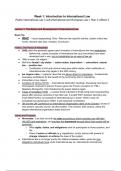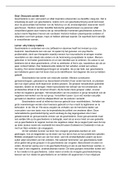Week 1: Introduction to International Law
Public International Law | LLB International and European Law | Year 2 | Block 2
Lecture 1: The Nature and Development of International Law
Exam Tip
● IRAC → Issue (signposting), Rule / Relevant law (specific articles, explain critical key
words, relevant case law), Analysis, Conclusion.
History: The Peace of Westphalia
● 1648, when the generally agreed upon formation of international law was established.
○ Before that, certain principles of international law (e.g immunities) have been
developed and in use, but not established as an area of law yet.
● “Who’s realm, his religion.”
● Shift from feudal / city states → nation states, imperialism → colonialism, natural
law → positive law
○ Codification of civil and criminal rules grew within states, while codification in
international law only began in the 20th century.
● jus cogens rules = ‘supreme’ laws that are above others in importance – fundamental,
necessary prohibitions for the benefit of the community (link to naturalism)
● Immunities vs jus cogens
● Congress of Vienna (1815) → international diplomatic meetings, discussing new layout
of European continent to prevent France (given the French revolution of 1789 +
Napoleon Bonaparte) from threatening the power balance again.
● Treaty of Versailles (1919) → a peace treaty intended to finally bring more long-standing
peace after previous centuries of war after war. It ended WW1 between Germany and
most Allied Powers; an example of international law in action. While it was not
completely successful given WW2, it was historical nonetheless.
● UN and the UN Conference on International Organisation (birth of the Charter): issues of
veto powers, security council, all other bodies. The moment, 20th century, where the
largest international organisation today was born.
Values and Purposes
● Hernandez: “Law lays out both the rules according to which societies can fulfil their
VALUES and aspirations, and provides the framework through which that society will be
governed.”
○ What rights, duties, and obligations exist for participants in those systems, and
the
○ Place of actors or officials (e.g. legislatures, courts, police) with powers to
change, interpret, or enforce the rules of the system.
● International law is no longer purely the relations between states, given the new
obligations individuals have under international law (ie, international criminal law).
, ● Purposes of International Law
○ Regulation of international relations → used to be solely between states, but
nowadays other actors are also involved (e.g. multinational corporations).
○ Substantive goal(s) of international laws → international peace, security, justice,
free trade, human rights, democracy…
The Base Foundation of International Law
● Grotius, On the Law of War and Peace
○ Ubi societas, ibi ius → in society, there is law.
○ “No association of men can be maintained without law… surely also that
association which binds together the human race, or binds many nations
together, has the need of law”
● Hobbes, Leviathan
○ When men live without a common power to keep them all together, they are
endlessly in a state of WAR — every man is an enemy to every other man. In
that condition, there is endless fear, danger, and violence; which is why having an
ultimate power to whom you sacrifice your freedom in exchange for protection, is
necessary. (Suggested dictatorship as the only effective way.)
● Locke, Second Treatise of Government (1690)
○ The state of nature requires:
■ An established, settled, known law
■ A known and indifferent judge, with authority to determine all
differences according to the established law
■ Power to back support the sentence when right, and give it due
execution.
● The key issue in international law that is not at all a domestic problem, is that most
subjects (ie, states) are all on the same footing. A horizontal legal order.
○ Additionally, the identity of the subjects is important; states make the law for
themselves, and states must also agree to adjudication on those laws.
○ There is consensual law making; adjudication by consent; and unilateral
enforcement (when excluding the Security Council).
● International legal positivism: Austin (England), Kelsen (Austria), Hart (he thought
international law was a sort of primitive legal system).
○ Kelsen → legal system cannot have conflict. He then realized conflict is going to
be there.
■ Pyramid structure: we abide by the decisions of ministers because of
laws. We follow laws because of the constitution. We follow the
constitution because of something outside of the legal system, an external
rule that gives reason (human nature, God etc).
○ States tend to have either a monist or dualist system in place to tie together their
international and domestic law.
● International law trickles down from states to individuals to communities (group
rights).





